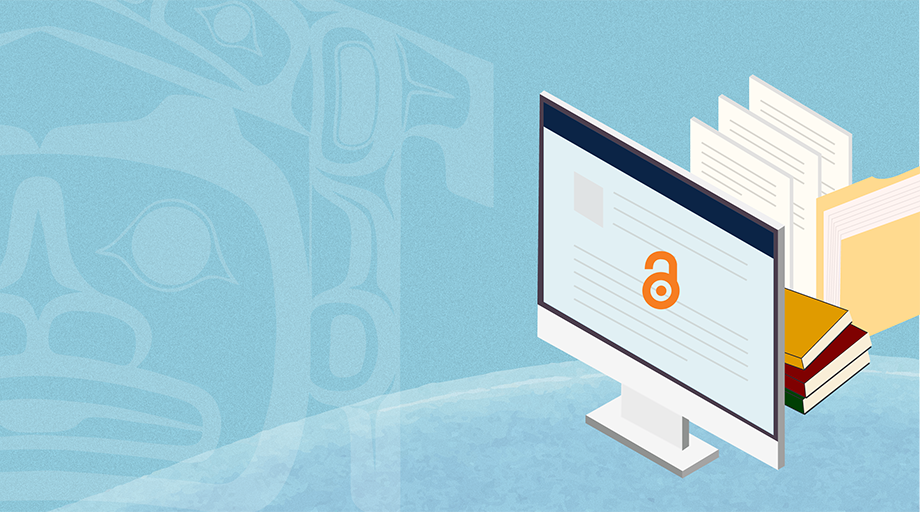
This year’s theme for Open Access Week (Oct 23 – 29, 2023) is an invitation to collaborate, as individuals and institutions around the world are asked to examine current approaches to open scholarship and discuss what is working, and what need to be revised, revived or replaced. Open access can pave the way for more equitable knowledge sharing, but is it succeeding?
Over the last several months, UBC Library and UBC Okanagan Library have engaged in open educational resource (OER) projects that focus specifically on Indigenous topics, in collaboration with UBC and UBCO faculty, other post-secondary institutions and OER partners. Through these projects, the library has helped publish open texts that seek to decolonize and indigenize course curricula, explore Indigenous perspectives on the open education movement, and found opportunities to share this work and more with the wider open access community.
Offering supports to create new, essential open texts
Open publishing has continued to gain momentum at UBC, as library faculty and staff provide expert support and resources through UBC Library’s Open Publishing Program. As an open access journal and text service, the program helps UBC faculty, researchers, instructors, students, and staff develop open access publications—including open access journals and textbooks—for scholarship and instruction.
Instructors at both UBC Vancouver and Okanagan campuses have been working to add texts to the library’s open catalogue, with resources that aim to decolonize and indigenize course curricula. These texts include:
- Decolonizing the Engineering Curriculum, by Pamela Wolf, Alex Gonzalez, Curtis Rattray, Debalina Saha, James Shaw, Nika Martinussen and Ben Harris
- Indigenizing the Japanese Language Curriculum: Materials to Introduce the Ainu Culture in Japanese Language Classes, by Nina Langton
- Indigenous Land-based Writing and Pedagogy Guide for Students and Instructors, by Kerrie Charnley, Jordan Stouck, Tania Willard (Work in progress)
- Creating Safer Learning Environments for Indigenous Students in STEM at UBC, by UBC SKYLIGHT: The Science Centre for Learning and Teaching
Learn more about open publishing at UBC.
Collaborative research on open educational resources development
With grant funding provided by the Canadian Association of Research Libraries (CARL), UBC librarians and co-investigators at Toronto Metropolitan University and BCcampus, are pursuing new research into open educational practices and Indigenous Knowledges. This ongoing research project, titled Foregrounding Indigenous Perspectives: Community and Collaborator Affinities and Conflicts in Open Education, will help provide new insights and identify gaps in the open education communities’ understanding of Indigenous perspectives.
“From our findings, we will be able to provide suggestions for people working within open education on how they can engage respectfully with Indigenous communities and Knowledge Keepers and, in doing so, we can help to eliminate the colonial violence being done to Indigenous communities within open education and the broader field of education,” says Donna Langille, Community Engagement and Open Education Librarian at UBCO Library.
Learn more about this project.
Sharing around the globe
At the Open Education (OE) Global Conference, held earlier this month in Edmonton, Alberta, librarians from UBC Library and UBCO Library presented on a number of topics, with a focus on Indigenous Knowledges, decolonization, resource advocacy, and more.
As a featured presenter, Kayla Lar-Son, the Indigenous Programs and Services Librarian at Xwi7xwa Library, delivered a keynote talk on The 6 R’s of Indigenous OER’s: Rethinking and Reworking Indigenous Open Education.
“Being able to give a keynote at OE Global, is a major step towards the advancement of open education for Indigenous peoples. Not only is this an opportunity to discuss the need for the advancement and funding of OER’s for Indigenous peoples, but gives a platform to discuss the other side of Indigenous OER’s and the careful considerations that we need to take when making Indigenous Knowledges open to everyone,” says Lar-Son